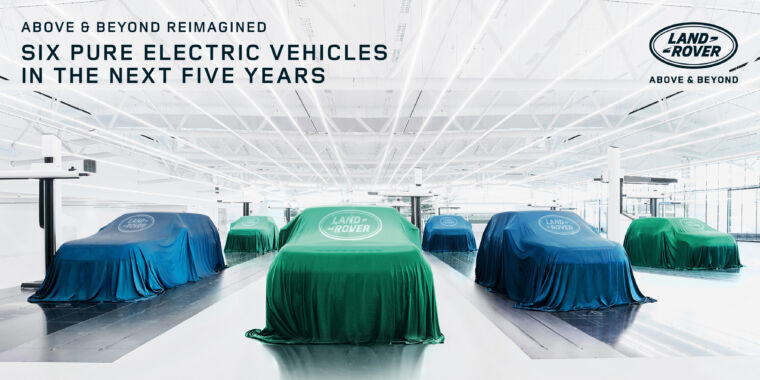
Jaguar Land Rover
There is big change for Jaguar Land Rover. The British carmaker has unveiled a new global strategy, as unveiled earlier Monday by new CEO Thierry Bolloré. There’s a new roadmap for Jaguar, which is losing its internal combustion engines as it focuses on pure electric luxury cars. Six new battery packs are underway for Land Rover, and the company is also researching hydrogen fuel cells.
“Jaguar Land Rover is unique in the global automotive industry,” Bolloré said. “Designers of unmatched models, an unmatched understanding of the future luxury needs of its customers, emotionally rich brand shares, a spirit of Britishness and unmatched access to leading world players in technology and sustainability within the broader Tata group. We use these ingredients today. to reintroduce the business, the two brands and the customer experience of tomorrow.With the Reimagine strategy we can strengthen and celebrate that uniqueness like never before.Together we can have an even more sustainable and positive impact on the world around our design. “
Under the Reimagine strategy, Bolloré said JLR would become a ‘battery first business’. For Land Rover, there are six new BEVs that will arrive by 2026, although the first of these will only be available in 2024. Future Land Rovers will be built using some new flexible vehicle architectures – Modular Longitudinal Architecture and Electric Modular Architecture – both of which are power aginostics. And production for MLA vehicles takes place at Solihull in the British Midlands.
By 2026, the brand will also be downsizing its diesel engines, and Bolloré said Land Rover should have no emissions by 2036, with the goal of having the entire company carbon neutral by 2039.
No more engines for Jaguars
For Jaguar, Reimagine means canceling the replacement of its XJ sedan; every new Jaguar introduced from here will be a BEV. In addition, Jaguar’s Castle Bromwich plant in Birmingham, England – which is currently building the XE, XF and F types, and which would build the new XJ – will cease to be a car factory when the three models reach the end of their product. . life cycles. But instead of closing the site, Bolloré says Jaguar will look at relocating other activities there, including expanding its lucrative group of special vehicles to the site.
These future Jaguars all use a new architecture for electric vehicles, and BEV manufacturing will take place in JLR’s Solihull factory. (Solihull is currently building the Jaguar F-Pace as well as Range Rovers.) But designing and building a brand new BEV platform is not a minute, and therefore Jaguar’s fully electric future will only begin in 2025. that means for Jaguar’s traditional two-seater sports cars remains unclear, but a replacement for the F-Type is by no means certain given low sales volumes.
